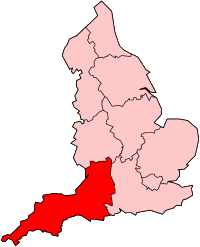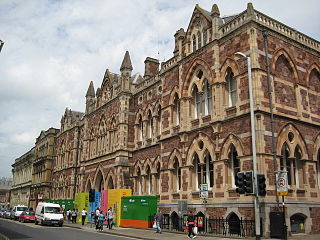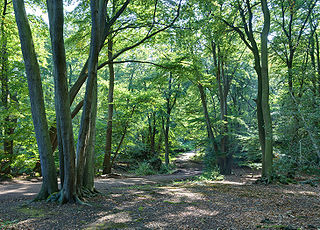Related Research Articles

Devon is a ceremonial county in South West England. It is bordered by the Bristol Channel to the north, Somerset and Dorset to the east, the English Channel to the south, and Cornwall to the west. The city of Plymouth is the largest settlement, and the city of Exeter is the county town.

South West England, or the South West of England, is one of the nine official regions of England in the United Kingdom. It consists of the counties of Cornwall, Dorset, Devon, Gloucestershire, Somerset and Wiltshire. Cities and large towns in the region include Bath, Bristol, Bournemouth, Cheltenham, Exeter, Gloucester, Plymouth and Swindon. It is geographically the largest of the nine regions of England with a land area of 9,203 square miles (23,836 km2), but the third-least populous, with approximately 5.7 million residents.
The Forestry Commission is a non-ministerial government department responsible for the management of publicly owned forests and the regulation of both public and private forestry in England.

The A30 is a major road in England, running 284 miles (457 km) WSW from London to Land's End.

The Tamar is a river in south west England that forms most of the border between Devon and Cornwall. A part of the Tamar Valley is a World Heritage Site due to its historic mining activities.

The Met Office Hadley Centre — named in honour of George Hadley — is one of the United Kingdom's leading centres for the study of scientific issues associated with climate change. It is part of, and based at the headquarters of the Met Office in Exeter.
The Environment Agency (EA) is a non-departmental public body, established in 1996 and sponsored by the United Kingdom government's Department for Environment, Food and Rural Affairs, with responsibilities relating to the protection and enhancement of the environment in England.

In the United Kingdom, regional development agencies (RDAs) were nine non-departmental public bodies established for the purpose of development, primarily economic, of England's Government Office regions between 1998 and 2010. There was one RDA for each of the NUTS level 1 regions of England. Similar activities were carried out in Wales by the Welsh Government Department of Economy and Transport, in Northern Ireland by the Department of Enterprise, Trade and Investment and in Scotland by Scottish Enterprise and Highlands and Islands Enterprise.
Sir Eric Dancer is a British businessman and formerly Lord-Lieutenant of Devon.

The South West of England Regional Development Agency (SWRDA) was one of the nine Regional Development Agencies set up by the United Kingdom government in 1999. Its purpose was to lead the development of a sustainable economy in South West England, investing to unlock the region's business potential. It was abolished along with all the other RDAs on 31 March 2012, with some of its functions being replaced by local enterprise partnerships.
James Stuart Jones is a retired Church of England bishop. He was the Bishop of Liverpool between 1998 and 2013.

Royal Albert Memorial Museum & Art Gallery (RAMM) is a museum and art gallery in Exeter, Devon, the largest in the city. It holds significant and diverse collections in areas such as zoology, anthropology, fine art, local and overseas archaeology, and geology. Altogether the museum holds over one million objects, of which a small percentage is on permanent public display. It is a National Portfolio Organisation under the Arts Council England administered programme of strategic investment, which means RAMM receives funding (2012–15) to develop its services.

Hele's School was a boys' grammar school, and latterly a comprehensive school, in the city of Exeter, Devon, England.

Advantage West Midlands was established in 1999 as one of nine regional development agencies (RDAs) in England. RDAs were created by the UK Government to drive sustainable economic development and social and physical regeneration through a business-led approach. Operating at arm's length from government, RDAs had business-led Boards that were appointed by the Secretary of State for Business, Innovation and Skills. Advantage West Midlands was closed on 31 March 2012 as part of the wider closure of the RDA network.

The United Kingdom, being in the British Isles, is ideal for tree growth, thanks to its mild winters, plentiful rainfall, fertile soil and hill-sheltered topography. In the absence of people, much of Great Britain would be covered with mature oaks, except for Scotland. Although conditions for forestry are good, trees face threats from fungi, parasites and pests. Nowadays, about 13% of Britain's land surface is wooded. European countries average 39%, but this varies widely from 1% (Malta) to 66% (Finland). As of 2021, government plans call for 30,000 hectares to be reforested each year. Efforts to reach these targets have attracted criticism for planting non-native trees, or trees that are out of place for their surroundings, leading to ecological changes.

John Studholme (1829–1903) was a 19th-century British pioneer of New Zealand, farmer and politician in the Canterbury region of New Zealand.
Captain Sir Paul Henry William Studholme, 2nd Baronet was a British Army officer and landowner.

Exeter is a cathedral city and the county town of Devon, South West England. It is situated on the River Exe, approximately 36 mi (58 km) northeast of Plymouth and 65 mi (105 km) southwest of Bristol.

Sir William Ralph Worsley, 6th Baronet,, is a British forester, farmer and businessman.
Sir Robert Harry Drayton, was a lawyer and a senior colonial civil servant who worked in Palestine, Tanganyika, Ceylon, Jamaica and Pakistan. He served as the Chief Secretary of Ceylon from 1942 to 1947 and as the Legal Secretary of Ceylon.
References
- ↑ "Harry Studholme". Bloomberg News. 11 January 2018.
- ↑ Tyler, Richard (5 April 2010). "Sir Harry Studholme defends regional development agencies". The Telegraph. Retrieved 12 January 2018.
- 1 2 Kidd, Charles, Williamson, David (editors). Debrett's Peerage and Baronetage (1990 edition). New York: St Martin's Press, 1990.
- ↑ "Who's Who: Studholme, Sir Henry (William)". Oxford University Press . Retrieved 11 July 2017.
- ↑ "Chairman". Forestry Commission. 11 January 2018.
- ↑ "Sir Harry Studholme appointed Forestry Commissioner for England". Farming UK. 11 January 2018.
- ↑ "Who owns Britain: Top UK landowners". Country Life. 11 November 2012. Retrieved 14 May 2017.
- ↑ "South West Regional Development Agency Non-Executive Directors continuing to serve on the Board Report". Department for Business, Innovation and Skills, UK Government. 26 July 2010. Retrieved 11 January 2018.
- ↑ "Forestry panel attacks UK government". the Guardian. 6 June 2014. Retrieved 11 January 2018.
- ↑ "Independent Panel on Forestry Final Report" (PDF). Department for Environment, Food and Rural Affairs, UK Government. 2012. Retrieved 11 January 2018.
- ↑ "UK: Wave Hub construction underway". DredgingToday.com. Navingo BV. 27 November 2009. Archived from the original on 27 July 2011. Retrieved 28 April 2018.
- ↑ "Our funding - Eden Project, Cornwall". www.edenproject.com.
- ↑ "£30 million leisure and tourism development for Osprey Quay". Sutton Harbour Group. 2007. Archived from the original on 9 February 2012. Retrieved 21 November 2007.
- ↑ "Forestry Commission".
- ↑ . "Board of Directors – Phaunos Timber Fund".
- ↑ "People « Lord Lieutenant of Devon"..